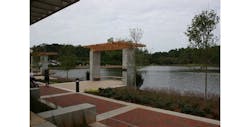Sustainability for the Student Center
Storm water management is sometimes where you end up at the last part of a project. Consider what happened at Furman University in Greenville, S.C., for example.
Several years ago, the student center at Furman needed an upgrade. Because more than 95% of the student body lives on campus, the student center has been described as a “family room,” where students can gather, buy books, watch a movie and take part in student organizations.
In good weather, the students have a tendency to take it outdoors, spilling out onto the grounds surrounding the student center.
Today, older alums gathering for homecoming would not recognize the place. A $6.75-million renovation meant an overall update to the existing building and the addition of 6,000 sq ft. Today’s Trone Student Center extends outdoors to include Hill Courtyard, shade pavilions, the Point of View fire pit and a boardwalk overlooking Furman Lake. And underneath it all, a way to clean the storm water before it gets to a nearby lake.
The ideas behind the project’s overall design centered on sustainability and aesthetics. Furman has long been known as a leader in sustainable design—it offers a major in sustainability studies, hosts the David E. Shi Center for Sustainability and helped spearhead construction of Cliffs Cottage, a model residential home that demonstrated green construction materials and methods.
The 1970s-era student center has undergone several renovations, including an addition in the 1980s and two other additions since then. The new exterior construction needed, therefore, to complement what was already there at the student center as well as at other areas on campus.
The answer was to install genuine clay StormPave permeable pavers by Pine Hall Brick Co. in the expanded outdoor space. Outside, the new permeable pavers are the same ones that were installed at the Shi Center six years ago.
The pavers also blend in well where they are laid alongside conventional English Edge pavers, also by Pine Hall Brick Co., that were put atop a concrete slab there a number of years ago.
The permeable pavers in patios and pathways and a composite deck are atop a sand-and-gravel system that filters storm water before it reaches an outflow pipe underneath, which then drains to Furman Lake.
The extra precautions taken over cleaning the water comes about as the result of increasingly stringent storm water regulations in South Carolina, according to engineer Richard H. Kapp, P.E., S.E., whose engineering firm—Professional Engineering Associates Inc. of Greenville, S.C.—has long overseen construction of the student center at Furman.
“The whole 700 acres of the Furman campus goes to a number of different storm drain outlets, and a good bit of it goes to (the lake),” said Kapp. “You have to clean the storm water before it gets there, and that’s typically the way that it is handled countywide, but particularly at Furman, with their emphasis on sustainability, their love of nature and the way they want to keep things nice out there.”
Engineers are required to consider water quality, whether it is free of pollutants that are washed from the surface and deposited into a stream or river, and water quantity, which is whether the system is designed to handle rain without flooding and causing property damage or loss of life.
“That’s one of our jobs—to protect the public,” said Kapp.
Walt Steele is paver business manager for Pine Hall Brick Co. Steele can be reached at [email protected] or 800.334.8689.


